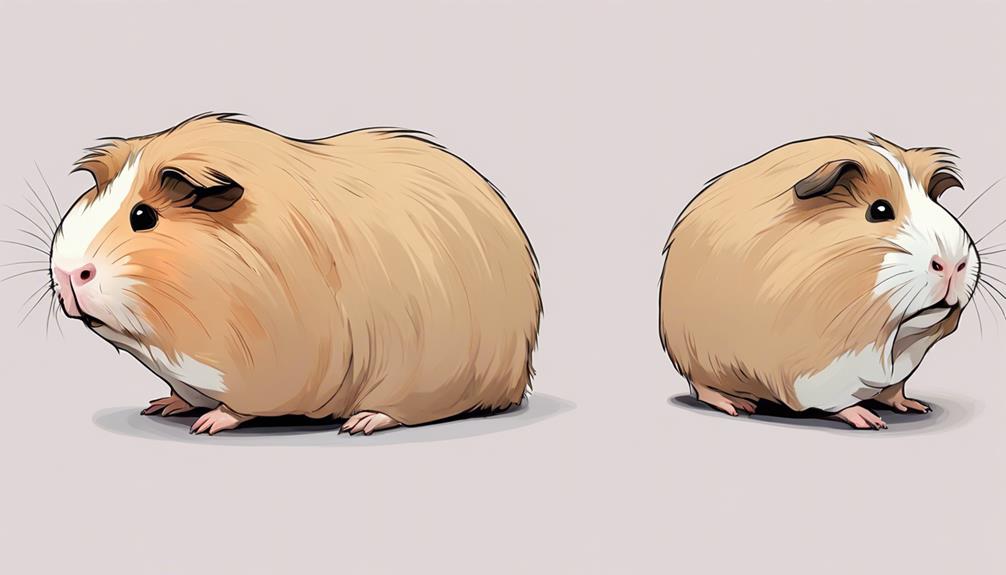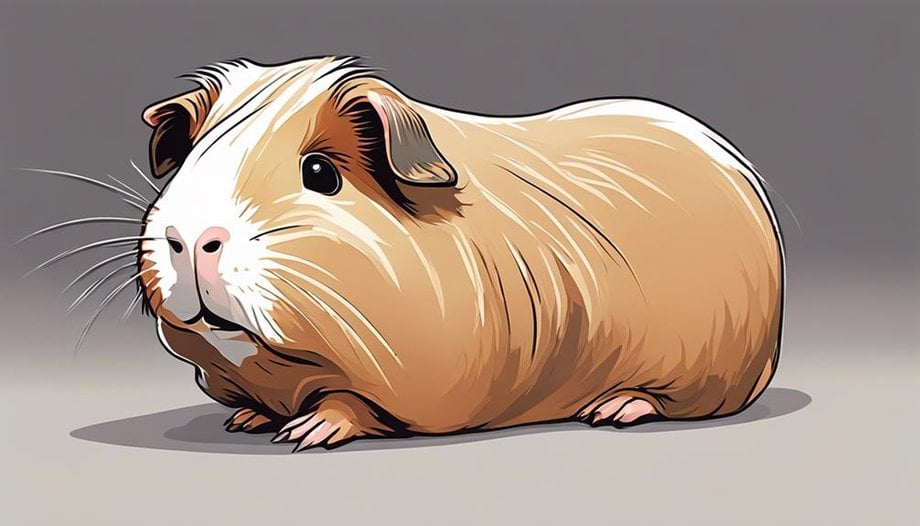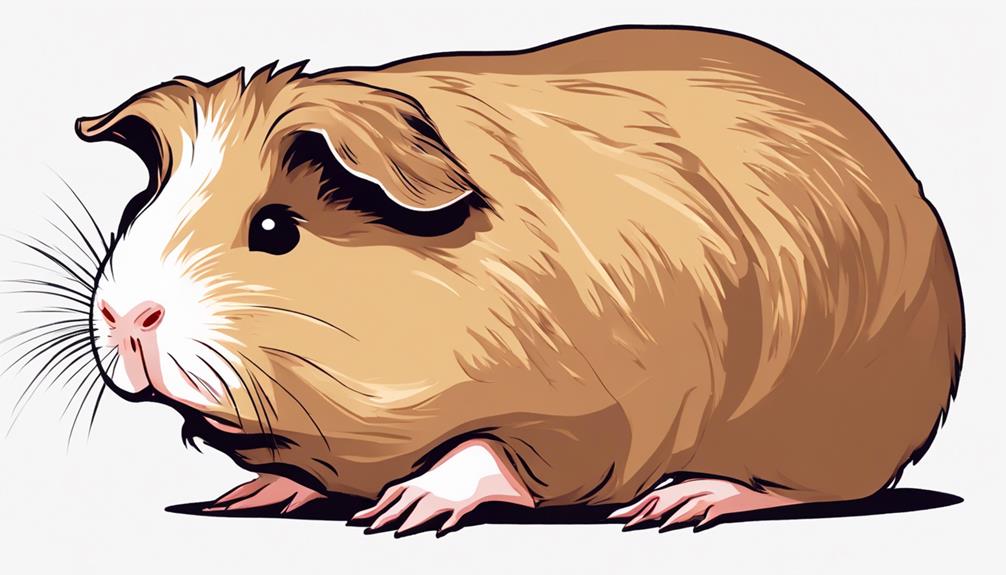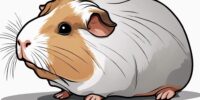What Signs Indicate Your Guinea Pig Is in Pain?

Signs of Guinea Pig Pain:
Decipher subtle cues to understand their well-being and detect silent suffering.
Watch for intricate signals revealing their distress.
Key Takeaways
- Changes in eating habits, vocalizations, hiding behavior, and aggressiveness are key signs of pain in guinea pigs.
- Lethargy can indicate discomfort, stress, or loneliness in guinea pigs.
- Unexplained weight loss may signal underlying health issues like digestive problems or dehydration.
- Immediate veterinary attention is crucial for guinea pigs showing signs of difficulty breathing or skin and coat issues.
Changes in Eating Habits
One of the key indicators that your guinea pig may be experiencing pain is a noticeable change in its eating habits. Guinea pigs are usually enthusiastic eaters, so any sudden shift in their food preferences or a decrease in their appetite could be a sign of underlying discomfort. Weight loss can also be a concerning factor linked to changes in eating habits. If you observe your furry friend avoiding their favorite foods or showing signs of digestive issues such as diarrhea or constipation, it might be an indication of pain.
It is important to pay close attention to any alterations in your guinea pig's eating behavior, as food aversion can be a subtle yet important sign of distress. Consulting a veterinarian when you notice such changes is essential to guarantee the well-being of your pet. Remember, understanding and addressing these shifts in eating habits promptly can aid in identifying and addressing potential pain or discomfort your guinea pig may be experiencing.
Abnormal Vocalizations
Guinea pigs communicate through a range of vocalizations, from gentle chirping to loud squeals.
High-pitched squealing, whimpering, or moaning may indicate distress or discomfort in these small creatures.
Continuous loud squeaking could be a sign that your guinea pig is experiencing pain and requires prompt attention from a veterinarian.
High-Pitched Squealing
If your guinea pig is emitting high-pitched squealing sounds, it may indicate discomfort or pain. In such cases, it's vital to pay close attention to your furry companion's well-being. Here are some emotional cues to guide you in understanding your guinea pig's distress:
- Heartbreaking: The sound of high-pitched squealing can tug at your heartstrings, signaling your pet's distress.
- Alarming: Hearing these noises may evoke a sense of urgency to alleviate your guinea pig's discomfort.
- Concerning: The unexpected change in vocalization can leave you feeling deeply concerned for your pet's health.
- Motivating: It can serve as a strong motivator to seek professional veterinary care promptly.
- Empathy: These sounds may evoke a strong sense of empathy, compelling you to take swift action to help your beloved guinea pig.
Whimpering or Moaning
Upon hearing whimpering or moaning from your guinea pig, be attentive as these abnormal vocalizations can indicate potential discomfort or pain. Pain indicators manifest not only physically but also through behavioral changes. Guinea pigs, known for their gentle nature, may vocalize distress through these sounds, revealing their inner discomfort.
When these sounds are heard, it's important to observe your pet closely. Note any other signs of unease such as reduced appetite or unusual body postures. Responding promptly to these cues can aid in addressing any underlying issues your guinea pig may be facing.
Continuous Loud Squeaking
When continuous loud squeaking emanates from your guinea pig, it signals a potential need for immediate attention to assess any underlying discomfort or pain. Addressing this behavior promptly is important for your pet's well-being.
Here are some poignant considerations to guide you through this challenging situation:
- Practice gentle communication techniques to comfort your guinea pig during this distressing time.
- Observe any behavioral changes in your pet's routine as they might provide valuable insights.
- Seek prompt veterinary care to diagnose the root cause of the loud squeaking.
- Implement effective pain management strategies recommended by your veterinarian to alleviate any suffering.
- Remember, your guinea pig relies on you for care and compassion; act with kindness and urgency to make sure their comfort and health.
Hiding Behavior
When a guinea pig begins to seek out unusual hiding spots, withdraw from social interactions, or exhibit changes in their eating habits, it may be a sign that they're experiencing discomfort or pain.
These subtle but significant shifts in behavior can serve as important indicators for pet owners to pay close attention to the well-being of their furry companions.
Understanding and recognizing these signs promptly can help make certain that appropriate care and attention are provided to the guinea pig in need.
Unusual Hiding Spots
In times of discomfort or pain, your guinea pig may seek out unconventional or unexpected hiding spots within their habitat. These mysterious creatures often find solace in the secrecy of their surroundings, retreating to places that offer them a sense of security. Some unusual hiding spots your guinea pig might choose are:
- Secret tunnels leading to cozy corners.
- Mysterious burrows beneath their bedding.
- Behind or under their food bowls.
- Within unused or forgotten hideouts.
- Camouflaged within foliage or toys.
Understanding and respecting your guinea pig's need for seclusion during times of distress is important in providing them with the care and comfort they require.
Decreased Social Interaction
Amidst their need for solitude in unique hiding spots, guinea pigs exhibiting decreased social interaction may demonstrate a form of self-preservation through their hiding behavior. Social withdrawal and behavioral changes often manifest as signals of distress or discomfort in these gentle creatures.
Isolation becomes pronounced as they seek to shield themselves from perceived threats, leading to diminished activity and interaction with their human companions. Observing such shifts in behavior is vital as it could indicate underlying pain or discomfort.
Understanding the subtle cues of decreased social interaction and increased hiding can aid in providing timely care and attention to alleviate any potential suffering experienced by these sensitive pets.
Change in Eating Habits
During times of discomfort or pain, guinea pigs may exhibit a change in their eating habits, often accompanied by noticeable hiding behavior. This shift can be an indication of underlying issues such as weight loss due to dental problems or digestive issues leading to appetite changes. To better serve these gentle creatures, it's important to pay attention to these signs and act promptly.
Here are some emotional cues to guide your caregiving journey:
- Witnessing your furry companion nibble less can tug at your heart, urging you to investigate further.
- Discovering your guinea pig cowering in a corner, trying to conceal its discomfort, might evoke empathy and a desire to provide comfort.
- Observing their once voracious appetite dwindle can stir a sense of urgency to seek help.
- Noticing your guinea pig losing weight despite regular feeding may prompt feelings of concern and a call to action.
- Recognizing that their hiding behavior is a plea for understanding can inspire a compassionate response.
Aggressiveness
The presence of aggressiveness in a guinea pig can serve as an important indicator of potential pain or discomfort. Behavioral changes, such as increased irritability or hostility, may signal underlying issues that need attention.
Guinea pigs are usually gentle and sociable creatures, so a sudden shift towards aggression could indicate distress. It's essential to take into account the stress levels the guinea pig may be experiencing and evaluate the handling techniques being used. Improper or rough handling can lead to fear or pain, causing the guinea pig to lash out defensively.
Additionally, grooming needs should be addressed, as neglecting proper grooming can result in discomfort or pain for the guinea pig. By observing and addressing signs of aggressiveness promptly, caregivers can make sure the well-being and happiness of their beloved pets.
Lethargy

Upon observing signs of aggressiveness in a guinea pig, caregivers should be attentive to the development of lethargy, as it may indicate underlying discomfort or distress. Lethargy in guinea pigs can be a subtle yet essential sign of their well-being. Here are some emotional cues to contemplate:
- Sleep Patterns: Changes in a guinea pig's sleeping habits, such as excessive sleeping or restlessness, could signal discomfort.
- Stress Levels: High stress can manifest as lethargy in guinea pigs. Pay attention to any recent changes that might be causing stress.
- Cage Environment: A messy or uncomfortable cage can contribute to lethargy. Make sure their living space is clean and stimulating.
- Handling Techniques: Rough handling can lead to stress and, consequently, lethargy. Practice gentle and proper handling methods.
- Bonding Time: Lack of interaction and bonding with caregivers can make guinea pigs feel lonely and lethargic. Spend quality time with them daily to foster a strong bond.
Being mindful of these aspects can help caregivers provide a nurturing environment for their guinea pigs.
Weight Loss
One must be vigilant for any unexplained weight loss in their guinea pig, as it could be an important indicator of underlying health issues. Weight loss in guinea pigs can be a sign of various health concerns such as digestive issues or dehydration. Observing changes in weight gain, coat condition, and hydration levels is vital in maintaining your guinea pig's well-being. Sudden or significant weight loss should prompt a visit to the veterinarian to rule out any serious conditions.
Guinea pigs are generally consistent in their eating habits, so any noticeable decrease in appetite leading to weight loss should raise concerns. Additionally, monitoring their coat condition can also provide insights into their overall health status. A dull, unkempt coat could indicate underlying health issues affecting their dietary intake or metabolism.
Difficulty Breathing

When observing a guinea pig, noticing any labored breathing or wheezing can be a significant indicator of potential health issues. Respiratory distress in these small creatures is a serious concern and shouldn't be overlooked.
Here are some points to contemplate when dealing with a guinea pig experiencing difficulty breathing:
- Immediate veterinary attention: Act swiftly if you notice any signs of respiratory distress in your guinea pig. Timely intervention can be critical in their recovery.
- Gentle handling and care: Handle your guinea pig with care and gentleness, especially when they're struggling to breathe. Comfort and reassurance are essential.
- Quiet environment: Provide a calm and peaceful environment for your guinea pig to reduce stress and aid in their recovery.
- Consultation with a veterinarian: Seek professional advice on treatment options and care strategies for guinea pigs with breathing difficulties.
- Breathing exercises and prevention techniques: Learn and implement breathing exercises and preventive measures to help your guinea pig maintain healthy respiratory function.
Skin and Coat Issues
In caring for a guinea pig, attending to any skin and coat issues promptly is paramount to ensuring their overall well-being and comfort. Dry, flaky skin and patchy fur loss are common indicators of underlying problems that necessitate attention.
Guinea pigs, with their delicate nature, require meticulous care, and their skin and coat serve as essential indicators of their health status. Dry, flaky skin can be a sign of nutritional deficiencies or inadequate grooming habits. Ensuring a balanced diet rich in Vitamin C and regular brushing can help alleviate these issues.
Patchy fur loss may stem from various causes, such as parasitic infestations or stress. Identifying the root cause through close observation and consulting a veterinarian is important in addressing this concern promptly.
Frequently Asked Questions
Can Guinea Pigs Experience Tooth Pain as a Sign of Discomfort?
Guinea pigs, like other animals, can experience tooth pain due to dental issues. This discomfort may manifest through behavior changes, such as grinding teeth and appetite loss. It's essential to monitor these signs for their well-being.
Are There Any Specific Types of Bedding or Cage Setups That Can Help Alleviate Pain for Guinea Pigs?
To create a haven for guinea pigs, opt for soft bedding options like fleece or paper-based materials. Comfortable setups with ample space, hiding spots, and toys can enhance their well-being. Cage modifications and stress reduction techniques contribute to a soothing environment.
How Can I Tell if My Guinea Pig Is Experiencing Emotional Distress or Anxiety, Rather Than Physical Pain?
To determine if a guinea pig is experiencing emotional distress or anxiety rather than physical pain, observe behavioral cues, vocalizations, body language, and weight loss. These signs can indicate underlying emotional issues that require attention and care.
What Are Some Common Misconceptions About Guinea Pig Behavior That Could Be Mistaken for Signs of Pain?
Common misconceptions about guinea pig behavior that could be mistaken for signs of pain include misunderstood behaviors like teeth chattering, rapid movements, or hiding. These communication cues are often misinterpreted, leading to unnecessary worry.
Are There Any Alternative Therapies or Treatments That Can Help Manage Pain in Guinea Pigs, Such as Acupuncture or Herbal Remedies?
Acupuncture benefits and herbal remedies are alternative therapies for pain management in guinea pigs. These strategies can provide relief and comfort. Consulting a knowledgeable veterinarian is crucial to guarantee the best care for furry companions.











